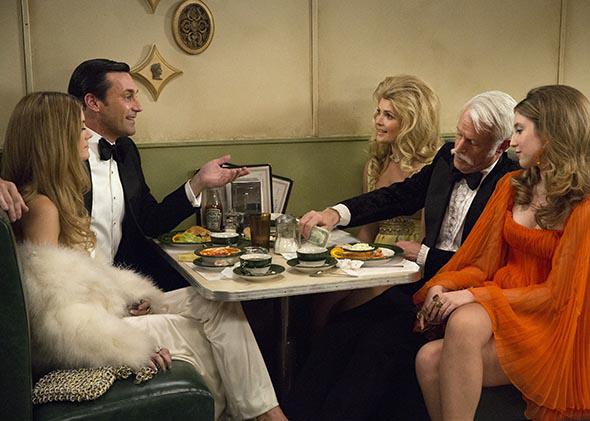Eat the rich! Screw the waitress! Matt Weiner unleashes his inner socialist! This episode simmers with class distinctions and resentments. Don makes a point of telling the models at the cattle call: “It’s chinchilla and it costs $15,000. How does that make you feel?” SCDP has fractured into the “filthy rich”—the partners who cashed out (Don, Roger, Joan, Pete)—and the mere professional class (Peggy, Ken). Don now likes to talk about “how poor he was,” says Roger, “but not anymore!” There are L’eggs ($1.39, cheap!) vs. Topaz (slightly less cheap). And of course the waitress at the roach-infested diner who feels obliged to earn the $100 tip Roger so ostentatiously laid on her table—more about her later.
The most memorable moment of my story on Weiner last year was when he summoned his disgust about what the ’60s idealists had curdled into, 20 years later: the “greediest motherfuckers” ever, a “bunch of hypocrites” who would lecture you about how they “invented sex” but were actually “repressive, selfish, racist,” and “money-grubbing.” Here, in this Altamont hangover (thanks for the timeline, John!), we get the first hint of the ’80s ruling class: hedonists who have facial hair like hippies but none of their politics, and who will soon divide America into castes.
John, you asked what Rachel Katz née Menken was doing in the episode. First, my (admittedly slightly bogus, but while I’m on a roll) Marxist theory. This is the moment when the urban department store, a creation of striving immigrants, starts to lose its cachet. (Joan mentions race riots.) The suburban mall, designed for housewives afraid to go to the city, and the big box store (stocking L’eggs, of course) are both about to make their appearance. In broader terms, success is shifting from manufacturing and luxury goods (represented by the department store) to services (represented by advertising), all of which will usher in the marginalization of the working class (chronicled by John Dos Passos, hiding in the waitress’s pocket).
That’s my conspiracy theory. Closer to the ground, Rachel is there to puncture Don’s confidence and remind him—and the viewer—that Don is still Don, weighed down by his past, tortured by his failure to be better: yes, John, aware of his own mortality and always haunted by ghosts. I mentioned in my last post, when Don in Episode 6 made his confession to Peggy: “I never did anything. I don’t have anyone.” Rachel’s sister stirred that up again when she told him, “She had everything. She lived the life she wanted to live.” The implication was, not everyone is destined to repeat their own mistakes and get trapped in Don’s dreams; some people move forward, and die as saints. As for the minyan—Jews, Catholics, what’s the difference; they are just props to rattle Don.
And the waitress? She is just practicing politics. (The businessman just wants to sit here and drink his coffee). In most of the episode, I thought Weiner was wry and biting about class, but with the waitress, he got too working-girl sentimental. The roaches, the prostitution, and then the bit of wisdom at the end: “When someone dies, you want to make sense of it. But you can’t.” We already got the point from Rachel’s sister. Don is searching, again. We don’t need the magical waitress to bring it home.
God, did I love that pitch meeting with Peggy and Joan, and particularly their tense expressions on the elevator ride afterward. John, you ask why Joan took the abuse from the sexist morons at the meeting. I wouldn’t expect anything else. Peggy always has to prove herself with every interaction, but Joan’s dignity has more reserve. It reminded me of the scene last season when Joan’s friend took her to a club, and she just patiently waited out the come-ons from men. To Joan they are children, and she can soothe herself later in a haughty grown-up way with an extravagant shopping spree.
I appreciated the scene also for its evocation of the new sexism. The old patriarchy operated with an assumption of entitlement, which also had a dose of chivalry. Women had to break through structural barriers at work— assumptions that they could be only secretaries, or couldn’t work once they got married. When they did, they found a brand of sexism in some ways more pernicious: pervasive, infantile misogyny, of the kind that still shows up on YouTube when someone secretly tapes a frat party. The upside, as Peggy points out, is that while it stings more, it doesn’t always leave a permanent mark. “Would you rather have had a friendly no?” Peggy asks.
As you’ve pointed out, Julia, Weiner has a genius for making scenes that are stagey and mannered yet nonetheless emotionally affecting, by capturing the small moments. The best example this week happened on Peggy’s date. I had wished for her in my last post a little vulnerability, and it broke through. She was brusque, pushy, unpleasant—until her date called her “fearless.” Once she’d won the label, she could relax; in fact, she melted. “I love veal,” she said, girlishly, and also like a housewife in an ad, and traded plates with him and started to fall in love.
Julia, at several points we didn’t know if we were in an ad or a dream or the current moment. Are you tired of that Mad Men trick? Or did it help set up the larger theme of the episode, that real emotion is getting hard to locate? Also, what’s with all the shots from the shoes up? Is that an old porn trope? A famous fur ad? Or does Weiner just really like a strappy sandal?
I’d set a lunch, but I think a dinner would be better,
Hanna
Read the previous entry, by John Swansburg | Read the next entry, by Julia Turner
